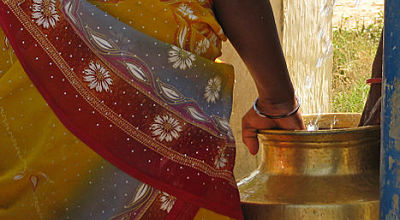Disappearing Daughters: India’s Female Feticide
Every 12 seconds, a baby girl is aborted in India. That’s about 7,000 girls killed every day just because they are females.
The United Nations now calls India the most dangerous place on earth for a girl.
So why are these parents taking such action? CBN News went searching for answers in a remote village of Rajasthan in northeast India.
Beware the ‘Medicine Man’
In rural villages and big cities, millions of families are turning to men like Kilash Boria to help eliminate their girl children.
For more than two decades, Boria’s father was known around Rajasthan as the medicine man. He created a secret brew that he’d give to pregnant women to help abort their babies.
“From the time I was a child I saw my father giving this drink to women in the village,” Boria told CBN News.
“Do you have any idea how many women your father saw during his lifetime?” CBN News’ George Thomas asked.
“At least 500 women,” Boria replied.
Abortion is legal in India. Sex-selective abortion, however, is illegal but widely common. The impact is devastating, with census figures showing the child sex ratios getting worse.
In 2001, there were 927 girls for every 1,000 boys. Now the girls in that ratio are down to 914. In some parts of the Indian state of Punjab, the ratio is as low as 300 girls.
“Indians are obsessed with having a boy,” Boria explained. “They just don’t want to have girls.”
Boria’s Deadly Brew
Like his father, Boria is also a farmer but with no training as a professional doctor. Nevertheless, Boria took over his father’s gruesome line of work when he passed away three years ago.
He now sees on average between four to five women each month. He showed CBN News how he concocts the traditional abortifacient.
“I crush the bark of the mango tree and marva tree together into paste-like substance,” he explained. “It has to sit for about two hours. I then mix it with other ingredients and black magic.”
The instructions to the pregnant woman are very specific: He tells her that this entire glass has to be consumed. But before that happens, Boria explains that about 100 milligrams of a locally brewed wine should be mixed with the pasty concoction.
Then on an empty stomach, first thing in the morning, half of it needs to be drunk. The remainder is to be taken right before going to bed with a full stomach.
“Within two or three days the women has an abortion,” Boria said.
And what is the evidence that Boria’s concoction is actually working? After each abortion the patient would place two coconuts on his front porch as a way of thanking him for his efforts.
Kaveena, 26, was one of those women. Several years ago she underwent an abortion with Boria’s help.
“I already had a son, but then I became pregnant again and discovered that I was having a girl,” she told CBN News. “The family and village pressure was so much I had to do it.”
War on Baby Girls
Kaveena’s story is one that’s playing out in millions of Indian homes.
“This is probably the worst kind of violence we are facing in our Indian history,” Dr. Sabu George, India’s leading advocate against female feticide, told CBN News. “It is genocide.”
According to a prestigious British medical journal, some 6 million females were aborted in the past 10 years.
“And we are heading towards 10 million girls in the coming decade,” Dr. George warned.
While the centuries-old preference for boys is often cited as the main reason, money is another big reason families kill their daughters.
Dr. Puneet Bedi works at Apollo Hospital, one of India’s top medical facilities. He said because of the country’s dowry tradition, the parents must often pay large sums of money to marry off their daughters. Sex-selective abortion is a quick way out of that economic burden.
“A daughter is considered a liability, and nobody wants too many liabilities in the house. So it is generally done in the second or third child, though of course some people will do it with the first child,” he said.
Author Gita Aravamudan has written about the problem in her book, Disappearing Daughters. She said this killing is more like a holocaust.
“It’s almost as if a whole gender has been exterminated, and we really don’t realize today what the repercussions are going to be,” she said.
Violence against Women
Violence and abuse against women is rampant. Rape cases are rising, and growing numbers are being trafficked or sold as brides.
“We just don’t feel safe on the streets,” one Indian woman said.
India has banned the use of medical technology to determine the sex of a baby, yet ultrasound clinics are a booming business.
Dr. Bedi said women have little trouble finding a physician or technician willing to break the law. Sex-selective abortion has emerged as a low risk, high profit business.
“The law against female feticide is now about 17 years old, but it has never been used. No doctor has really paid for his crime as yet,” Bedi said.
Back in Rajasthan, Boria isn’t getting paid anything near what trained medical professionals in the big cities get to perform gender-based abortions.
Still, he insists that he plays a crucial role in his community.
“I don’t do it for the money,” he insisted. “I do it to keep families together, to keep the harmony in the community. If I don’t, there will be lots of trouble between family members.”















































